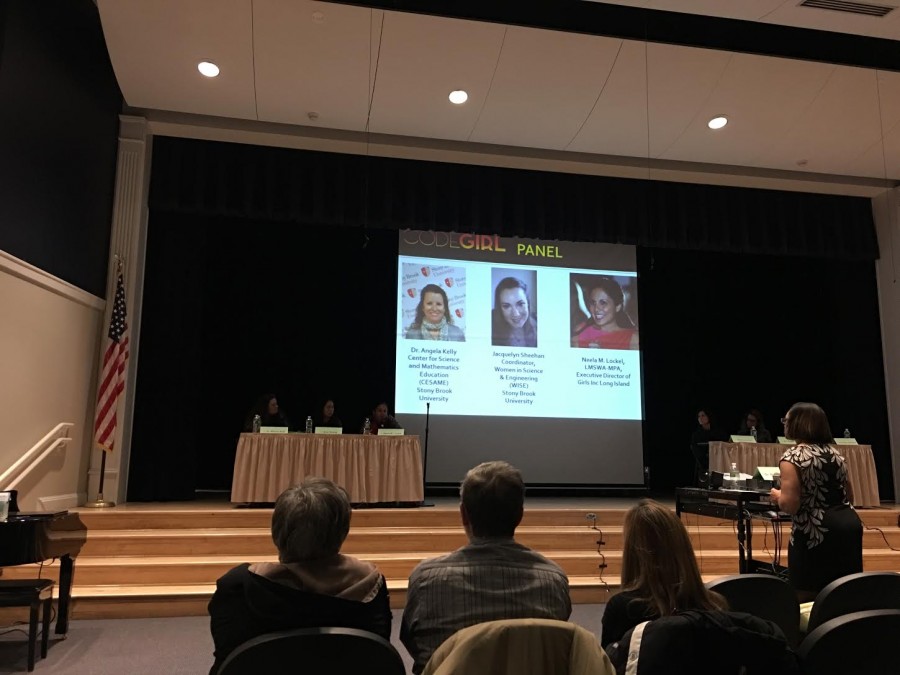CodeGirl Documentary Screening: Community Leaders Discuss the Importance of Women in STEM
March 15, 2016
On March 1st, the district held a screening of the documentary CodeGirl at Setauket Elementary School. The documentary is about the annual Technovation technology and entrepreneurship competition. This competition, unlike the majority of competitions that incite students to tackle problems and envision new forms of groundbreaking technology, is a student challenge created specifically for middle school and high school girls.
The main premise of the competition is for young girls to tackle a problem in their community by developing a smartphone app. They must design and code an app that would successfully change the lives of the people around them, and analyze their solution’s financial prospects and consumer appeal. Thus, the competition makes strides toward integrating girls into the fast-evolving field of computer science, which is largely male-dominated.
Technovation is unique in that beyond helping students broaden their scope of knowledge and combat societal issues, it, in and of itself is a project towards eliminating the gender gap in STEM fields. The documentary follows the stories of 5,000 girls from 60 countries that used this project to help them combat issues such as waste elimination, women’s safety, and childhood obesity. It explains that only 7% of all tech startups are led by women, and thus explored the necessity of women making strides to bridge this gap.
After the documentary was shown, a panel of distinguished guests discussed the issue about the benefits of learning to code, and the importance of women involved in science, math and technology. The panel was comprised of Amy Huang, WMHS junior in the InSTAR® program and prospective computer science major, Dr. Marnie Kula, WMHS Science Chairperson and InSTAR® director, Dr. Angela Kelly, CESAME, Sony Brook University Associate Director of Science Education/Assistant Professor of Physics and Astronomy, Melora Lofretto, Executive Director/Co-Founder of kidOYO and CodeLI.org, Neela M. Lockel, LMSW-MPA, Executive Director of Girls Inc. Long Island, UWLI, Jaquelyn Sheehan, Coordinator of Women in Science and Engineering (WISE), Stony Brook University.
These women discussed their not only their experience in science and technology, and how they became involved, but also their ideas about how the next generation of girls can become even more involved. They also challenged certain pervasive stereotypes about women in science and discussed the economic benefits of teaching girls how to code.
Amy Huang explained that she believes that if younger girls were more exposed to “leading female figures in STEM fields, they would definitely be more interested to go into the fields.” She also commented on how when one thinks of prominent technology CEOs, names such as: Bill Gate, Steve Jobs, and Mark Zuckerberg come to mind, and this can discourage young girls. She stated that at the event, a panel member commented how elementary school aged girls seem to show interest, however, by high school that interest seems to wane. Huang also commented on how in many of the science and technology classes she has taken, there were dramatically less girls than boys. She recounts, “In junior high school I took an electricity and design class that was all boys except for three girls, and then midway through the quarter, one of the girls dropped the course.” Dr. Kula, commented on how adding a female teacher to the male-dominated physics department at Ward Melville has incredibly raised female interest in the subject.
Huang stated, “I loved the film, the idea of the competition, the ideas of the young women who participated in the competition, and ultimately the message that the documentary presented.” She also explained how there are boundless opportunities presented to anyone in STEM and that people can literally code innovation that will allow society to “make a change, develop and become better.” And thus, computer science can spur growth in any field from medicine to politics.
The screening was an inspirational and provocative event that helped raised awareness about a gender gap in STEM that can be combatted from an educational level upward. It is a project that Three Village can take on to ensure a brighter tomorrow for not only women, but also the world at large.
See the following link for more information about the Technovation Challenge: http://www.technovationchallenge.org/?page=1



